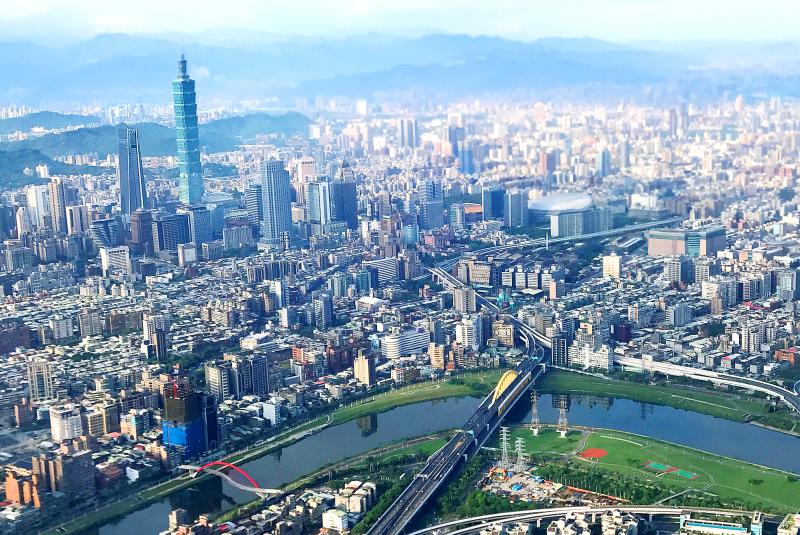Taiwan has been ranked Asia’s No. 1 “full democracy,” jumping three places in the 2021 Democracy Index rankings from the previous year, a report released on Thursday by the Economist Intelligence Unit (EIU) said.
Globally, Taiwan has climbed to the No. 8 position, from 11th in 2020, scoring 8.99 out of 10, the EIU report showed.
Regionally, Taiwan was ranked ahead of Japan and South Korea.

Photo: Reuters
“Asia and Australasia have five ‘full democracies,’ including three Asian ones (Japan, South Korea and Taiwan), alongside Australia and New Zealand,” the report said.
The EIU bases its findings on five factors: electoral process and pluralism, civil liberties, functioning of government, political participation and political culture.
The factors are used to assess the state of democracy in 167 countries and regions worldwide.
Based on a range of indicators, each country is given an overall score out of a maximum of 10, and is classified as a “full democracy,” “flawed democracy,” “hybrid regime” or “authoritarian regime.”
The developed countries of Western Europe continued to dominate globally last year, with 12 of 21 ranked as “full democracies,” the EIU said.
Taiwan was the only Asian country in the top 10, while Norway topped the global rankings with a score of 9.75, followed by New Zealand (9.37), Finland (9.27), Sweden (9.26), Iceland (9.18), Denmark (9.09) and Ireland (9.0).
Australia and Switzerland were tied in ninth place with a score of 8.9, ahead of the Netherlands (8.88), Canada (8.87), Uruguay (8.85), Luxembourg (8.68) and Germany (8.67), which were ranked 11th to 15th.
The US was ranked 26th and classified as a “flawed democracy.”
The EIU said that the number of “full democracies” fell from 13 in 2020 to 12 last year, with Spain ranked 24th and slipping into the same rank as the US.
In the bottom positions were North Korea, Myanmar and Afghanistan, placing 165th to 167th.
The report mentioned the effect of the COVID-19 pandemic on freedom around the world.
“The pandemic has resulted in an unprecedented withdrawal of civil liberties among developed democracies and authoritarian regimes alike, through the imposition of lockdowns and restrictions on traveling and, increasingly, the introduction of ‘green passes’ requiring proof of vaccination against COVID-19 for participation in public life,” it said.
The EIU’s first Democracy Index report was issued in 2006.

Taiwan has received more than US$70 million in royalties as of the end of last year from developing the F-16V jet as countries worldwide purchase or upgrade to this popular model, government and military officials said on Saturday. Taiwan funded the development of the F-16V jet and ended up the sole investor as other countries withdrew from the program. Now the F-16V is increasingly popular and countries must pay Taiwan a percentage in royalties when they purchase new F-16V aircraft or upgrade older F-16 models. The next five years are expected to be the peak for these royalties, with Taiwan potentially earning

STAY IN YOUR LANE: As the US and Israel attack Iran, the ministry has warned China not to overstep by including Taiwanese citizens in its evacuation orders The Ministry of Foreign Affairs (MOFA) yesterday rebuked a statement by China’s embassy in Israel that it would evacuate Taiwanese holders of Chinese travel documents from Israel amid the latter’s escalating conflict with Iran. Tensions have risen across the Middle East in the wake of US and Israeli airstrikes on Iran beginning Saturday. China subsequently issued an evacuation notice for its citizens. In a news release, the Chinese embassy in Israel said holders of “Taiwan compatriot permits (台胞證)” issued to Taiwanese nationals by Chinese authorities for travel to China — could register for evacuation to Egypt. In Taipei, the ministry yesterday said Taiwan

Taiwan is awaiting official notification from the US regarding the status of the Agreement on Reciprocal Trade (ART) after the US Supreme Court ruled US President Donald Trump's global tariffs unconstitutional. Speaking to reporters before a legislative hearing today, Premier Cho Jung-tai (卓榮泰) said that Taiwan's negotiation team remains focused on ensuring that the bilateral trade deal remains intact despite the legal challenge to Trump's tariff policy. "The US has pledged to notify its trade partners once the subsequent administrative and legal processes are finalized, and that certainly includes Taiwan," Cho said when asked about opposition parties’ doubts that the ART was

If China chose to invade Taiwan tomorrow, it would only have to sever three undersea fiber-optic cable clusters to cause a data blackout, Jason Hsu (許毓仁), a senior fellow at the Hudson Institute and former Chinese Nationalist Party (KMT) legislator, told a US security panel yesterday. In a Taiwan contingency, cable disruption would be one of the earliest preinvasion actions and the signal that escalation had begun, he said, adding that Taiwan’s current cable repair capabilities are insufficient. The US-China Economic and Security Review Commission (USCC) yesterday held a hearing on US-China Competition Under the Sea, with Hsu speaking on